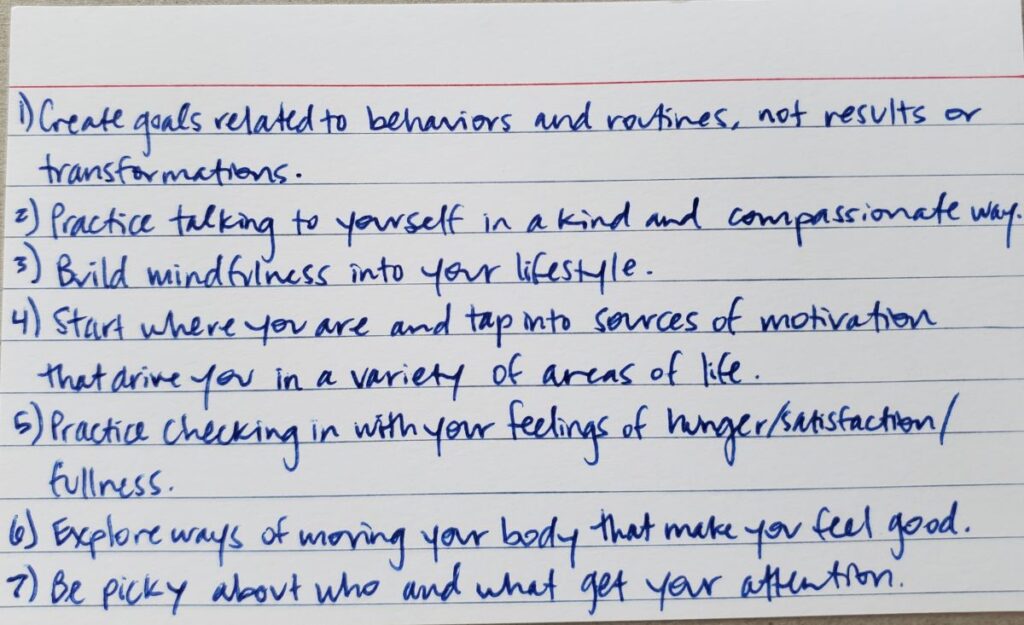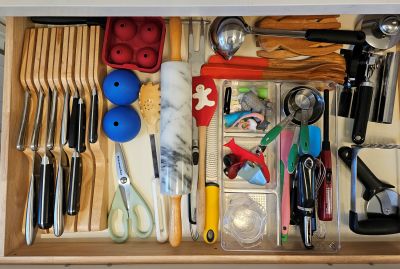This is the second post in a series about improving your wellness without dieting. To see the first post, which is an overview of all 7 tips, click here. The post which follows highlights the first 3 tips related to goals, self-talk and mindfulness in detail.

1. Create goals that are behavior-based instead of focusing on results or transformations
Goals are more likely to be met when they focus on behaviors and tasks which can be completed in a typical day and easily repeated. By staying consistent with new behaviors over time, new habits are formed and results are achieved. It’s simple but it’s not easy because adding new behaviors to a routine or decreasing the frequency of current behaviors involves addressing habits.
Habits are actions that have been taken on a consistent basis for long enough that the decision-making needed usually requires very little mental processing or intentional decision-making. Sometimes habits feel automatic. These automatic decisions can help us get closer to goals, make it more difficult to reach goals, or have very little impact either way.
Health behavior change involves learning what your habits are and finding ways to do more of what gets you closer to your goals and/or less of what makes it difficult to achieve that progress. It takes time, requires a lot of attention and persistence, and can set you up for lasting improvements in how you feel as well as decreased risk of certain health conditions. It’s not about doing things exactly the same way forever, but instead staying focused on where you are, what your goals are and how you can make progress to those goals consistently. Working on health behavior change involves learning and developing skills which serve you for a long time.
When it comes to diet habits, for example, you might consider whether you eat in response to hunger or something else like the availability of food or uncomfortable emotions or boredom. Start by observing current habits without judgment and if you decide you might benefit from doing things differently and you’re ready to experiment with a change, you might set yourself up to check in with yourself more often about your internal cues related to hunger, satisfaction and fullness. By identifying one behavior-related goal and small adjustments you can experiment with, then practicing and staying consistent with the new behavior, you’re much more likely to make a lasting meaningful change to your habits that is aligned with your goals.
If you’re interested in making changes to your habits, start with small adjustments to your current routines and create your personal best habits. You are the expert of what will work for you. Identify choices that are currently part of your routine and consider where you might benefit from making small changes that help you feel your best. With repetition over time those small changes will happen more easily, then you might consider adding a new small change to your routine that helps you strive for your health goals.
Stay skeptical of quick fixes, fads and trends related to wellness. Whether it’s supplements or diets or exercise programs or beauty treatments or one of the many many offerings in this trillion dollar industry, consider whether the offering is good for you or if it’s actually just good for those who make money off of the product or service being sold. There’s something to be said for things we pay for that help us feel our best, but if it claims to solve a problem and inevitably doesn’t, it’s more of a scam than an indulgence.
I created a self-guided program for getting started with health behavior change!
Are you interested in starting to work on your health behavior change goals? In addition to offering one-on-one coaching services, I’ve also created a 21-day program designed to let you experiment with goal-setting, action planning, and experimentation as you work on your health goals. You’ll get daily prompts, helpful worksheets and educational materials for getting started on your health behavior change goals! Click here to complete a form and get started.
2. Practice talking to yourself in a kind and compassionate way
We often get discouraged with ourselves which leads to the way we talk to ourselves shifting into a more harsh and unhelpful monologue. If you notice that this is true for you, imagine talking to another person as if that person is experiencing the same frustration you are. This way of responding to automatic thinking can help to shift thinking into being more solutions-oriented, calm and rational. A shift in mindset and reflexive thinking isn’t the only thing that’s needed in order to change habits, but it can be a powerful tool that contributes to making changes that serve you well, staying consistent with those changes, and maintaining new habits.
An example of when this skill becomes especially useful is when things inevitably don’t go as planned and it can be easy to start thinking along the lines of, “Well, now that I did X, it’s all ruined. I’ve failed. What’s the point of continuing to try to do this?” If, instead, the situation can be observed without judgment, it’s more likely to shift thinking so it’s more helpful and along the lines of finding solutions. That might sound like, “OK, that happened and it wasn’t what I’d planned but here’s how I’m going to take a small step in the direction of my goal,” and it’s more likely that the actions that follow will contribute to continued progress.
3. Find ways to build mindfulness into your lifestyle
Mindfulness is the practice of bringing attention to the present moment rather than thinking about the past or the future. The idea of mindfulness is not to eliminate thoughts about the past or the future, but rather to more easily notice when thoughts arise, which makes it easier to identify those thoughts and find ways to keep thinking helpful and positive.
Examples of practices which can help to bring mindful awareness to your life include deep breathing, meditation, muscle relaxation, and journaling. Less formal practices that can also bring more mindfulness into your lifestyle include mindful eating, intentional decision making, gratitude, and limiting distractions to help with being fully present by yourself and when you’re with others.
Exploring and practicing mindfulness-based techniques can help with stress management, observing patterns without judgment, noticing patterns and identifying opportunities for making small adjustments, building resilience, and maintaining new habits.
There are many important considerations when approaching health behavior change and being set up for success. These concepts related to setting goals, focusing on self-talk, and practicing mindfulness should be considered helpful tips for educational purposes rather than individualized recommendations.
Check out the next post in this series, part 3 of 4, on improving wellness without dieting!
READY TO GET STARTED?
Book A Free Discovery Call
Are you ready to stress less while you make progress toward your health goals with evidence-based strategies and support from a coach? Book a discovery call today and let’s see if we’re a match to work together.







0 Comments